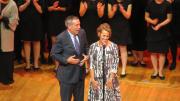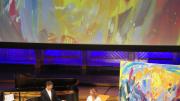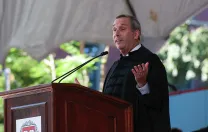A Thursday evening “Musical Prelude to the Inauguration: A Welcome and Celebration,” crafted by the Office for the Arts and held in Sanders Theatre, became a showcase for the making, performing, and professing of multiple arts at the University, featuring students and teachers and extending beyond music to painting, drama, and dance. In this sense, it was less Hollywood- and celebrity-centric than the 2007 version—not least because, in the wake of Drew Faust’s arts initiative, there are more practitioners on the faculty, and an undergraduate concentration in theater, dance, and media in the curriculum.
President Bacow and Adele Fleet Bacow have championed the arts in diverse ways. The 55,000-square-foot Granoff Music Center, home to the Tufts department of music and its central classroom, practice, and performance spaces, opened in early 2007, at the midpoint of his presidency there, and the couple contributed its Steinway grand piano, in honor of their parents. Adele Bacow, who plays piano, told the Harvard Gazette that she intends to move a baby grand into the Harvard presidential residence, Elmwood, and a good deal of her professional practice at her firm, Community Partners Consultants, focuses on cultural development and the arts. So the pre-inaugural event was a good opportunity for the Harvard arts community, broadly defined, to strut it stuff—and it responded with gusto.
In a prelude, pianist Tony Yang, who is pursuing a dual Harvard-New England Conservatory degree in economics and piano performance, joined talents with Carissa Chen ’21, a studio artist, who painted a large canvas. That work was projected on screen in real time, with a voice-over explaining her creative process, as Yang played Debussy’s “Clair de lune.”
Next, the program featured some of the new musical practitioner-professors who have enlivened the department and performance teaching on campus, and their students: Rosenblatt professor of the arts and jazz pianist Vijay Iyer and senior lecturer on music and director of jazz bands Yosvany Terry joined forces with graduate students Rajna Swaminathan, a percussionist and composer, and Ganavya Doraiswamy, a vocalist, as the Ritual Ensemble of Harvard.Both student musicians are in the Creative Practice and Critical Inquiry doctoral program. They performed “Chasing the Gradient,” by Swaminathan, beginning with two prayers by Doraiswamy, who then delivered a haunting chanted song over jazzy piano, drum, and saxophone riffs.
Iyer then introduced Samora Pinderhughes, a composer and pianist/vocalist who was admitted to the department for graduate study, but is touring this year as a Soros Justice Fellow. His work melds performance with social justice (read a recent New York Times review here), as explained in a video clip in which he talked about “the artist’s responsibility…to reflect the times.” The song he sang, accompanying himself on the piano, is titled “For Those Lost,” and speaks to people subjected to police violence and incarceration.
In the final element of this part of the program, Iyer then joined the Parker Quartet, Harvard’s Blodgett Artists in Residence, to jointly perform the final two movements of his “Time, Place, Action,” a jazzy and modern-classical elegy to Amiri Bakara, the poet, critic, and social activist.
Switching gears, the evening shifted toward a crowd-pleasing undergraduate love-letter to “Larry,” in the form of a medley of modified Motown hits, an affectionate nod to President Bacow’s Michigan roots, performed singly and together by three a cappella groups: the Krokodiloes, the Harvard Opportunes, and the Radcliffe Pitches. As a backdrop, a mock Motown LP was projected behind the performers, with suitably Harvardian song titles, and the songs shifted in synch (sample lyric: “He’s leaving on that midnight T to Harvard”).
Continuing the theme, subtly, the next piece was composed by Detroit native and pianist Paul Schoenfeld, professor of composition at the University of Michigan, whose signature style combines popular, folk, and classical idioms, in a vibrant, easily digested way. For this occasion, undergraduates Amir Siraj ’21 (piano), Noah Lee ’22 (cello), and Anna Lee ’21 (violin) performed Café Music. As a reminder of just how young they are, Siraj said his concentration was astrophysics, Anna Lee’s was literature, and Noah Lee’s was “undecided”—surely a freshman prerogative.
Then, in an only-at-Harvard moment, Chloe Brooks ’19, as Socrates, and Julius Wade ’20, as Glaucon, directed by Mitchell Polonsky ’19, presented a dramatic sketch based on the Allegory of the Cave, from Plato’s Republic: a fundamental discourse on enlightenment, on coming to understanding, as the cave dweller, or prisoner, begins to “see himself in his own proper place. He will contemplate himself as he is.” As a parable about education, it is hard to improve upon “this is what I dream of when I dream of reading and writing and seeing and living and loving.”
That earnest lesson absorbed, the evening then proceeded toward an invigorating and celebratory conclusion, again featuring performers who are now Harvard teachers: professor of the practice of music Esperanza Spalding, the jazz bassist, singer-songwriter, and lyricist; and kick-the-lights-out tap dancer Ayodele Casel, a Harvard Dance Center visiting artist, performing her one-woman work “While I Have the Floor” (which merits watching, here)—pyrotechnics, with some pointed commentary on the exclusion of women artists from their rightful place in the firmament.
For the grand finale, Doraiswamy returned to chant, and began a percussive beat by slapping her hand to her chest. She was joined on stage by the Harvard Glee Club and Radcliffe Choral Society, beating in time, before they all ended up delivering a moving version of Sweet Honey in the Rock’s “We Are” (“We are our grandmothers’ prayers/We are our grandfathers’ dreamings/We are the breath of the ancestors/We are the spirit of God”)—whereupon the choruses divided to admit Terry on sax, Swaminathan on percussion, and the inexhaustible Casel dancing to, well, beat the band some more.
The Bacows, exhilarated and clearly moved, came to the Sanders stage to applaud the performers. Adele Fleet Bacow thanked the artists for the welcome, and for their indelible demonstration of “the passion, the soul of Harvard.” He extended the thank-you to the people back stage who had made the performance possible, and then invited all and sundry across the way to Annenberg, for a celebratory dessert—a fitting transition to the merriment promised on the morrow.











